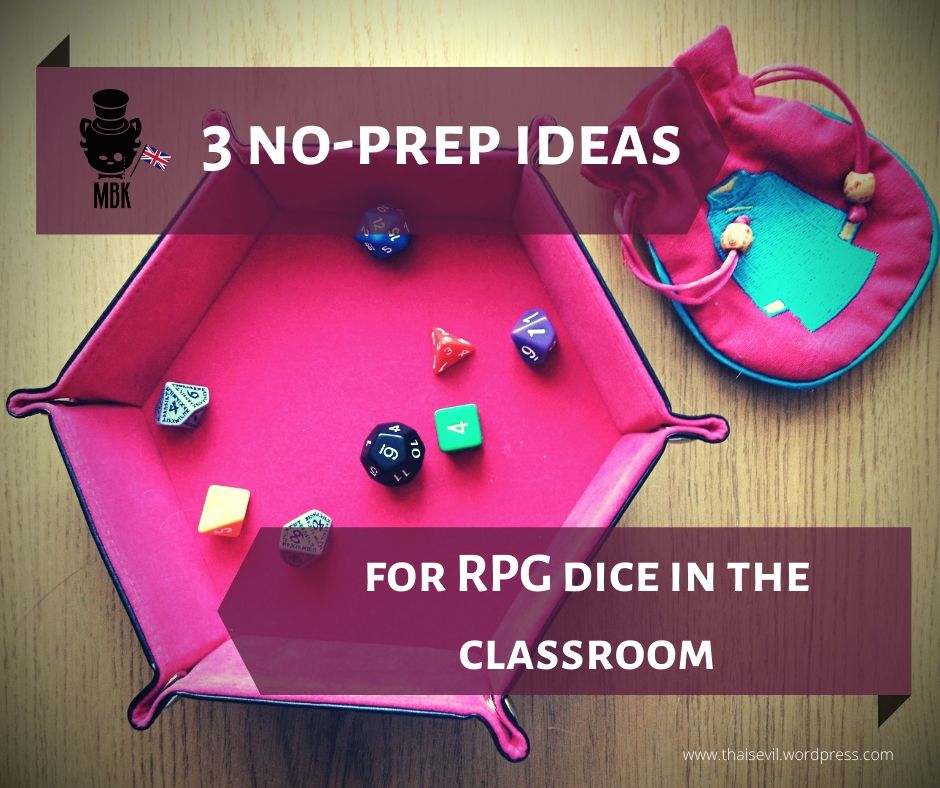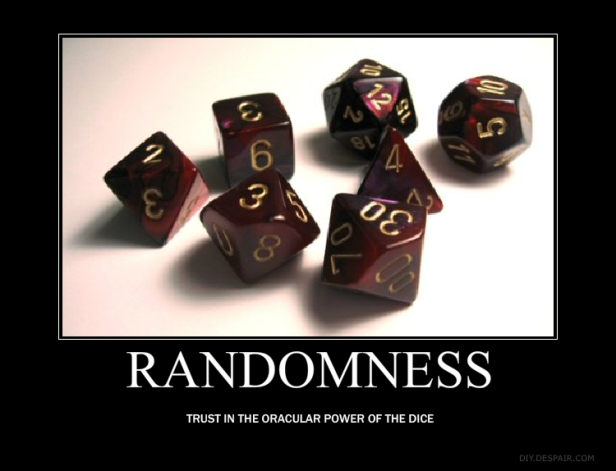3 no-prep ideas for RPG dice in the classroom

We all use dice, some of use more often than others – I used to resort to rolling dice whenever I couldn’t make up my mind (odds – option A, evens – option B). It was natural for me to bring my many-sided dice to classroom as they are so easy to use in a range of activities. And when Teacher’s Corner decided to go with proper dice sets, I couldn’t help but remember all the good times I’ve spent with them in my classroom.
So, today I want to share three very easy ideas you can use in your classroom. You will only need a set of dice, something to write on (and with) and a bunch of students who want to have fun. The great thing is, those activities are perfect for all students of EFL, regardless of their linguistic proficiency.

No-prep conversations
This is the idea I’ve already shared with Teacher’s Corner, and it can easily take up to 45-60 minutes, so if you want to spend the whole lesson on having fun while observing your students communicate in English – that’s the task for you.
Before you start the game, on the board write 20 words that have been introduced recently, or those that students like the most (criteria depend on your creativity – there can be, e.g., words beginning with the letter L, etc.). Explain that students will work in pairs on short conversations, each of which will be completely different, because each chat will be determined by the roll of the dice. Each pair rolls dice and based on the results determines the participants, what the conversation will be about, where it will take place etc.
At the beginning of the game, students must make a series of dice rolls.
Rolling a four-sided die (so-called d4) will allow students to determine who they will act out (e.g. 1 means that they will pretend they are a celebrity, 2 – a superhero, 3 – a character from literature or a movie, 4 – an alien).
Rolling d6 will determine the kind of conversation (e.g. 1 – family chat, 2 – phone conversation with a long-lost friend, 3 – quarrel with a classmate or colleague, 4 – negotiations with a terrorist, 5 – first date, 6 – accidental conversation with teacher / lecturer / boss).
Rolling d8 will determine the place where the meeting takes place (e.g. 1 – park, 2 – school / work, 3 – cemetery, 4 – pub / disco, 5 – bank, 6 – hospital, 7 – street, 8 – museum).
Two d10 will help to narrow down the topics of the conversation. I suggest that one d10 means actions (e.g. go, take, do etc. – depending on the group’s level), and the other describe adjectives (e.g. big, small, beautiful etc. – depending on the group).
Rolling d12 will help to determine the topic of conversation. If the task is to practice general English, you can try a wide range of topics (e.g. 1 – weather, 2 – friends, 3 – money, 4 – natural environment, 5 – hobby, 6 – art, 7 – technology, 8 – feelings, 9 – everyday routine, 10 – learning, 11 – shopping, 12 – animals), you can also narrow them down and specify the topics to the ones the group should practice at the moment.
The last polyhedron, d20, will indicate which of the words previously written on the board should be used during the conversation.
Once all the pairs have their results, give them some time to work on the conversations. Remember, this is a task during which a friendly alien can meet not-so friendly unicorn for a family chat in the pub. They will pet beautiful spiders and talk about the apocalypse, and the word fabbergasted will have to appear during the conversation.

Boardgames
If you need something less complicated, go for boardgames! You can replace casual d6 with other dice and make the game more entertaining. Even if you want your students to play a casual snakes&ladders game, make them use d4 to make sure players answer more questions and the game takes more time to finish.
If you encourage your students to make their own boardgames (like in one of my favourite exercises here – click!) you may suggest they use various dice to add some extra rules. For example, a player may decide which mode they want to play – d4 would be the easiest one when it comes to difficulty but most challenging to finish first. On the other hand, d10 would give fair chance to get to the finish line first, but the challenges might be so difficult that a d4 player might actually finish first.
Ah, the thrill of taking calculated risk.

Name so many things…
If you appreciate those two ideas but are looking for something short and simple, RPG dice come to rescue as well! Just tell your students “please, name things starting with a letter S, find words describing a person, write down idioms about health” and roll the dice to determine how many. For less advanced groups d8 will be a good idea, for more proficient ones – d12 or even d20.
You can also use the dice to add a bit of fun to your writing activities. Make your writing assignment instruction like “Write 10+k12 sentences about xyz” and ask your student to roll a die to determine how many sentences they need to write. Or write a random word on the board (it may be cat, factory or murder) and ask your students to roll dice. The result of the roll is the place the given word must be placed in a composition (e.g. the word is music and the student rolled 3, so their composition may start like this He hated music – and yet he was a brilliant singer.)
Whichever way you choose, I’m sure you’ll have a lot of fun!











Leave a Reply
Want to join the discussion?Feel free to contribute!